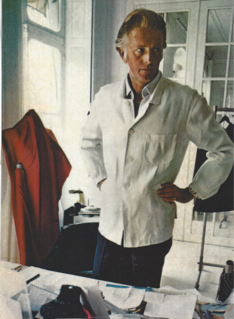A Quote by Hubert de Givenchy
My grandmother had a cupboard where she kept her collections and textile samples of all sorts of things. When I had good grades, I could take out one piece of work to look at.
Related Quotes
At that moment a very good thing was happening to her. Four good things had happened to her, in fact, since she came to Misselthwaite Manor. She had felt as if she had understood a robin and that he had understood her; she had run in the wind until her blood had grown warm; she had been healthily hungry for the first time in her life; and she had found out what it was to be sorry for someone.
I want to die consciously, without fear, and without anger. Three things. I see my friends dying with fear and anger and it's terrible. My grandmother kept her clothes ready for 40 years for her funeral. She lived to 103! But she kept the clothes in a cupboard. As the styles changed, she changed the clothes! I think if I start now with my funeral, it's good.
My grandmother, who picked cotton, and my mom, who picked cotton as a child - my grandmother had a work ethic. She had 13 children that she had to raise and ended up for a time moving into the projects, but because my grandmother had a work ethic, she didn't stay in the projects... that's not how she wanted to raise her children.
Now very much against her will, she thought of the way Jace had looked at her then, the blaze of faith in his eyes, his belief in her. He had always thought she was strong. He had showed it in everything he did, in every look and every touch. Simon had faith in her too, yet when he'd held her, it had been as if she were something fragile, something made of delicate glass. But Jace had held her with all the strength he had, never wondering if she could take it--he'd known she was as strong has he was.
But she still had that something which fires the imagination, could still stop one's breath for a moment by a look or gesture that somehow revealed the meaning in common things. She had only to stand in the orchard, to put her hand on a little crab tree and look up at the apples, to make you feel the goodness of planting and tending and harvesting at last. All the strong things of her heart came out in her body, that had been so tireless in serving generous emotions. It was no wonder that her sons stood tall and straight. She was a rich mine of life, like the founders of early races.
Oh, she doesn't belong to anybody now,' he said, and suddenly I saw her for what she was - a piece of refuse waiting to be cleared away: if you needed a bit of hair you could take it, or trim her nails if nail trimmings had value to you. Like a saint's her bones could be divided up - if anybody required them. She was going to be burnt soon, so why shouldn't everybody have what he wanted first? What a fool I had been during three years to imagine that in any way I had possessed her. We are all possessed by nobody, not even by ourselves.
My grandmother stepped back into the kitchen to get their drinks. I had come to love her more after death than I ever had on Earth. I wish I could say that in that moment in the kitchen she decided to quit drinking, but I now saw that drinking was a part of what made her who she was. If the worst of what she left on Earth was a legacy of inebriated support, it was a good legacy in my book. ~Susie's grandmother, Lynn pgs 315-316
Charlie had Sophie strapped to his chest like a terrorist baby bomb when he came down the back steps. She had just gotten to the point where she could hold up her head, so he had strapped her in face-out so she could look around. The way her arms and legs waved around as Charlie walked, she looked as if she was skydiving and using a skinny nerd as a parachute.
In this moment she felt that she had been robbed of an enormous number of valuable things, whether material or intangible: things lost or broken by her own fault, things she had forgotten and left in houses when she moved: books borrowed from her and not returned, journeys she had planned and had not made, words she had waited to hear spoken to her and had not heard, and the words she meant to answer with. . . .
You had every right to be. He raised his eyes to look at her and she was suddenly and strangely reminded of being four years old at the beach, crying when the wind came up and blew away the castle she had made. Her mother had told her she could make another one if she liked, but it hadn't stopped her crying because what she had thought was permanent was not permanent after all, but only made out of sand that vanished at the touch of wind and water.
The Flapper awoke from her lethargy of sub-deb-ism, bobbed her hair, put on her choicest pair of earrings and a great deal of audacity and rouge and went into the battle. She flirted because it was fun to flirt and wore a one-piece bathing suit because she had a good figure she was conscious that the things she did were the things she had always wanted to do. Mothers disapproved of their sons taking the Flapper to dances, to teas, to swim and most of all to heart.
Day and night she had drudged and struggled and thrown her soul into her work, and there was not much of her left over for anything else. Being human, she suffered from this lack and did what she could to make up for it. If she passed the evening bent over a table in the library and later declared that she had spent that time playing cards, it was as though she had managed to do both those things. Through the lies, she lived vicariously. The lies doubled the little of her existence that was left over from work and augmented the little rag end of her personal life.
From the first time he'd met her, he'd sensed an air of contradiction about her. She was very much a woman, but still retained a waiflike quality. She could be brash, and at times deliberately suggestive, yet she was painfully shy. She was incredibly easy to get along with, yet she had few friends. She was a talented artist in her own right, but so self-conscious about her work that she rarely completed a piece and preferred to work with other people's art and ideas.







































